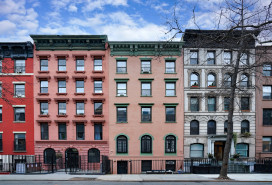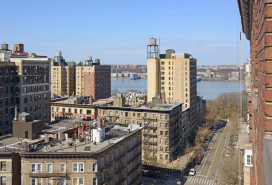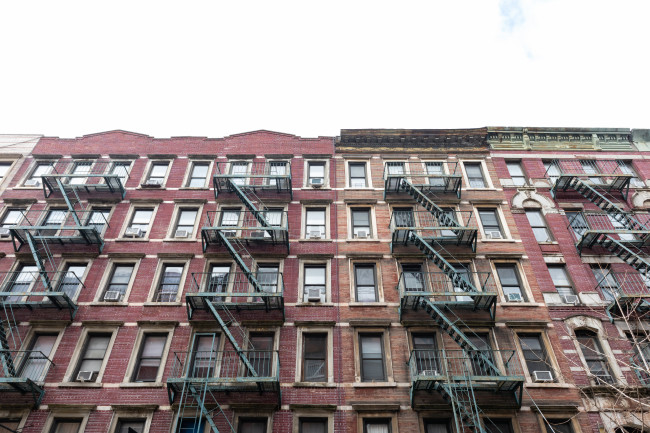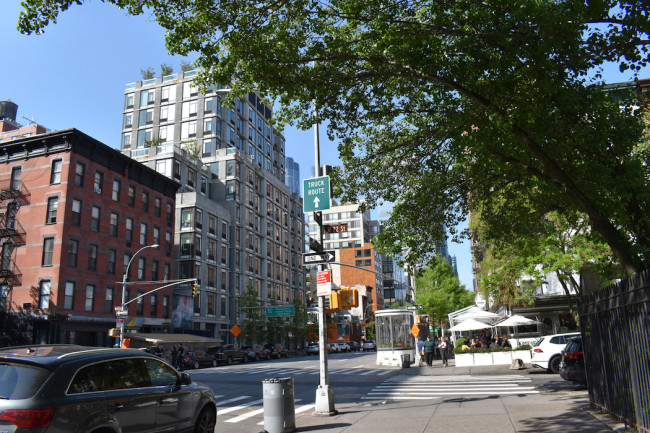How to freeze your rent through two NYC programs
- Certain older New Yorkers and those with disabilities are eligible for a rent freeze
- You could save hundreds of dollars a month on rent if you qualify for either program

You can get in touch with a rent freeze program specialist by calling 929-252-7242.
iStock
Think your rent is too damn high? You might be able to freeze it through one of two New York City programs.
Nearly one in five NYC metro-area tenants fell behind on their rent as of October last year, but many older adults and New Yorkers with disabilities can avoid a rent increase.
If you’re a senior living in a rent-regulated apartment, or if you have a disability, you to avoid a rent hike under the Senior Citizen Rent Increase Exemption (SCRIE) and Disability Rent Increase Exemption (DRIE), as long as you meet the eligibility requirements.
That means if you’re facing a rent increase and you qualify for one of these programs, the city can either freeze your rent at one-third of your monthly income, or the monthly rent you paid before your last rent increase, whichever is greater.
The Department of Finance will cover the difference between what you pay and what your landlord could legally charge you through a tax abatement credit, says Chris Wagner, outreach manager for the rent freeze team at the Mayor’s Public Engagement Unit. (For example, one Hell’s Kitchen renter currently pays $535.75 a month in rent, even though their landlord could legally charge them $2,170.55 per month, according to a list of Manhattan SCRIE benefits.)
“These resources are important, especially for our older adults population and persons with disabilities,” Wagner says. “If a client gets in the rent freeze program, that’s one less client that’s facing eviction…or going to housing court.”
Read on to learn how you can freeze your rent with SCRIE or DRIE.
How to find out if you’re eligible
To qualify for either program, you must live in a rent-stabilized or rent-controlled apartment or a rent-regulated hotel or single room occupancy unit. But if you live in a Mitchell-Lama building or a Housing Development Fund Corporation Cooperative, you can also benefit from DRIE.
To qualify for SCRIE, you must be 62 years or older, have a household income of $50,000 or less, and spend at least one-third of your income on rent. For example, if your annual income is $50,000, you must spend more than $1,388.89 a month on rent to qualify, according to the city.
DRIE has the same income requirements, though you only need to be 18 years or older to qualify. You also need to use one of the following government benefits: the Federal Supplemental Security Income (SSI), Federal Social Security Disability Insurance (SSDI), the Department of Veterans Affairs disability pension or compensation, and the U.S. Postal Services disability pension or compensation.
You are also eligible if you receive disability-related Medicaid and have previously received Supplemental Security Income SSDI in the past.
If you’re not sure whether you’re eligible, check out the city’s online tool which will ask you a series of questions to see if you fit either program’s requirements. You can also ask a rent freeze program specialist by calling 929-252-7242.
What documents will I need for the application?
To apply for both programs, you need documents establishing three things: your income, your age, and your rent.
Those documents would include government-issued photo identification cards, copies of your state income tax returns—including all schedules and 1099s—and copies of your current and prior leases. You can view all the required documents for DRIE and SCRIE listed at the bottom of the application to both programs.
And make sure you have a signed copy of your current and previous lease, Wagner says.
“The lease has to be signed—that’s a common question [we get],” Wagner says. “To apply for the program, you have to submit your current and prior lease that has to be signed by the landlord and yourself.”
How do I apply?
You can get in touch with a rent freeze program specialist who can help with your application by calling 929-252-7242.
You can also apply to DRIE online or SCRIE online, or print and fill out a paper form for DRIE here and SCRIE here. Next, mail those forms along with your supporting documents to the New York City Department of Finance, Rent Freeze Program – DRIE, P.O. Box 3179, Union, NJ 07083.
If you need more time to apply to a rent-freeze program because of a physical or mental impairment, you can also call 311 or schedule an appointment online to get help from the Department of Finance, which administers the program.
You can always call 311 or the rent freeze hotline if you’re having trouble applying for either program.
Should I apply if I’m not sure I qualify?
Thousands of older adults and New Yorkers with disabilities are eligible for a rent freeze, but not everyone takes advantage of the programs, Wagner says. Only 71,665 eligible New Yorkers froze their rent in 2020, the last year data for the program’s usage was available, while 135,000 households were eligible to participate in SCRIE and DRIE.
“If you’re ever unsure, just apply, and we’ll take the rest from there,” Wagner says. “You have a right to get this benefit if you’re eligible.”
Plus, eligibility requirements could change. A bill introduced by State Senator Brian Kavanagh would require the State Division of Housing and Community Renewal to adjust the maximum income thresholds for SCRIE and DRIE each year. Another bill, introduced by State Senator Liz Krueger, would require the State Commissioner of Housing and Community Renewal to notify certain New Yorkers that they could be eligible for the program.
“Unfortunately, tens of thousands of eligible New Yorkers are struggling to pay the rent without even knowing these programs exist,” Krueger says. “It’s vital that we make it easier for potentially eligible renters to learn about SCRIE and DRIE, as well as to increase the income eligibility cap so that all parties—renters, landlords, and city taxpayers—can reap the most benefit.”
You Might Also Like

























